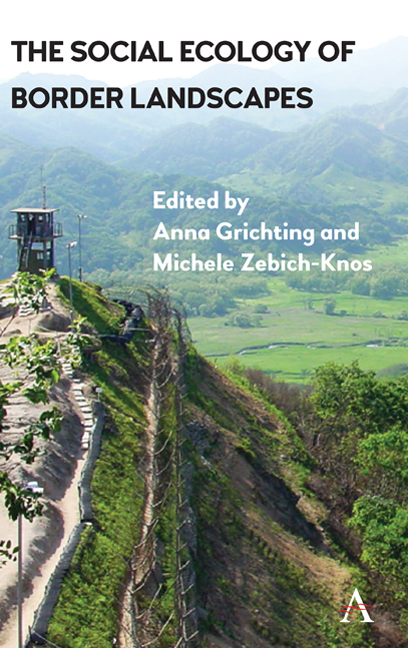Book contents
- Frontmatter
- Contents
- List of Illustrations
- Preface
- List of Contributors
- Introduction: Social Ecologies and Borderlands
- Part I FRAMES: MAPPING SOCIAL ECOLOGIES IN BORDER TERRITORIES
- Part II BRIDGES: RESILIENCE, RESTORATION AND RECLAMATION
- Part III CORRIDORS: CATALYSTS AND COLLABORATION IN CONFINED SPACES
- Part IV PORTALS: DIALOGUE, EXCEPTION AND RETERRITORIALIZATION
- Chapter Eleven Australia Day: A Social Ecology Dialogue across Aboriginal and White Cultures
- Chapter Twelve Re-legislating the Soil: Enclosures and Exception at the Amazon Frontiers
- Chapter Thirteen Mediterranean Edges: Reterritorializing Natural and Social Ecologies
- Conclusion: Making Sense of Social Ecology, Borders and the Environment
- Index
Chapter Eleven - Australia Day: A Social Ecology Dialogue across Aboriginal and White Cultures
from Part IV - PORTALS: DIALOGUE, EXCEPTION AND RETERRITORIALIZATION
Published online by Cambridge University Press: 10 January 2018
- Frontmatter
- Contents
- List of Illustrations
- Preface
- List of Contributors
- Introduction: Social Ecologies and Borderlands
- Part I FRAMES: MAPPING SOCIAL ECOLOGIES IN BORDER TERRITORIES
- Part II BRIDGES: RESILIENCE, RESTORATION AND RECLAMATION
- Part III CORRIDORS: CATALYSTS AND COLLABORATION IN CONFINED SPACES
- Part IV PORTALS: DIALOGUE, EXCEPTION AND RETERRITORIALIZATION
- Chapter Eleven Australia Day: A Social Ecology Dialogue across Aboriginal and White Cultures
- Chapter Twelve Re-legislating the Soil: Enclosures and Exception at the Amazon Frontiers
- Chapter Thirteen Mediterranean Edges: Reterritorializing Natural and Social Ecologies
- Conclusion: Making Sense of Social Ecology, Borders and the Environment
- Index
Summary
Australia Day, January 27, 2011, is a big event in the Australian calendar. It is a public holiday much anticipated and dreaded by parents and children, respectively, as it indicates the end of the long summer school holidays. The general populous sees it as a time to don the cloth of nationalism in the proclamation of the nation-state. Overall, it is a day of raw exuberance and celebration, but sometimes it gets ugly; it is the irruption of a nationalist sentiment that influences who is wanted and who is not wanted on these shores.
There is a little cove on the shores of Sydney Harbour, a favored haunt of tourists and Japanese brides alike, where the Sydney Harbour Bridge and the Opera House vie for prime camera attention. A small but significant crowd gathers in the pre-dawn. Uncle Max is only slightly nervous. He has been locked up with 30 or so dancers for the past four days, refining the performance that will tell the stories of his country — Yuin country (which extends from Merimbula to Port Jackson) — about five hours’ drive south of Sydney. They will dance the stories of the sacred mountain Biamunga. The dance is new, the original one long lost in the colonial dismemberment of Aboriginal culture. Today Australia “celebrates” more than 200 years of white occupancy.
Uncle Max Harrison is known as Dulumunmun, the tribal name both his son and grandson also hold. It was a privilege to bestow that name on his blood. There is no language now — just a few words, the odd expression. He's an aged Elder with a silver grey beard, longish hair to match and a plump, firm belly that hangs over his tightened belt. He is diabetic like most of his mob. He knows today is important, not for the reasons that most people think, but for the fact that he will soon see an enactment of his culture that has been absent on this land for at least 150 years.
It has been no easy process to fill the gaps in the story and to let the choreographers translate it into dance.
- Type
- Chapter
- Information
- The Social Ecology of Border Landscapes , pp. 197 - 208Publisher: Anthem PressPrint publication year: 2017



